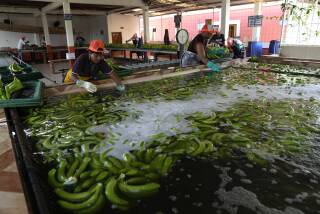Trading with Ecuador
- Share via
Peasant farmers in the Andean nations of Colombia, Ecuador, Bolivia and Peru often have a choice of growing two crops: flowers for export to the United States or coca for cocaine production. In accordance with U.S. anti-drug policy, Colombia and Peru have stepped up enforcement on coca cultivation, if to little avail. Bolivia doesn’t even try: President Evo Morales, who is head of the largest coca growers union, defends it as part of Bolivia’s cultural patrimony.
But in Ecuador, roses have kept coca at bay. Ecuador’s flower industry blossomed after President George H.W. Bush signed a regional trade agreement in 1991, which Congress extended and expanded as the Andean Trade Promotion and Drug Eradication Act of 2002. The agreement allows reduced-duty or duty-free exports to the U.S. of goods such as clothing, tuna and cut flowers, and has created more than 130,000 jobs in Ecuador and an estimated 37,400 in the U.S., according to Ecuadorean trade officials.
Although the U.S. approach to combating drug cultivation in Latin America is largely ineffective, this tactic has worked, and it is the primary reason the pact should not be allowed to expire at the end of this month. Whether the trade preferences with Ecuador will be extended, however, is uncertain. If San Ramon, Calif.-based Chevron Corp. has its way, Congress will instead punish Ecuador because its government refuses to halt a private lawsuit against the oil giant. The plaintiffs maintain that the company is responsible for pollution that contaminated their water and land and sickened the indigenous peoples of the Ecuadorean Amazon.
Halting the trade agreement at Chevron’s behest would harm broader U.S. interests. It would throw farmers out of legitimate business ventures and into the arms of cocaine traffickers. It would create needless ill will in a region where President Obama has promised to end North American bullying and begin a new era of rapprochement. And for the U.S. government to wield its power in an effort to force a favorable outcome in a private claim would justly generate international outrage. Chevron has said that if it loses the case, which could cost it an estimated $27 billion, it will appeal to international courts; that remains the appropriate course of action.
There are other factors for Congress to consider in determining whether to extend Ecuador’s trade preferences: workers’ rights and trade and investment policy also are important. And there are issues that remain to be negotiated between the two countries. But in each of these areas, Ecuador has demonstrated a willingness to work with the U.S. That should be the test for an extension of trade benefits, not the private interests of one corporation.
More to Read
Sign up for Essential California
The most important California stories and recommendations in your inbox every morning.
You may occasionally receive promotional content from the Los Angeles Times.













